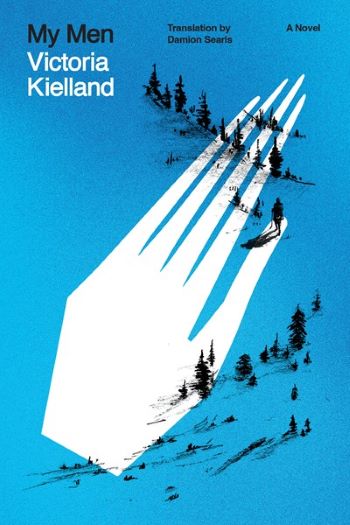[ad_1]
The Translator’s Voice is a new monthly column from Ian J. Battaglia here at the Chicago Review of Books, dedicated to global literature and the translators who work tirelessly and too often thanklessly to bring these books to the English-reading audience. Subscribe to his newsletter to get notified of new editions as well as other notes on writing, art, and more.
My Men—written by Victoria Kielland and translated from Norwegian by Damion Searls—is an intoxicating novel. From the first page, we’re brought into the hypnotic world of Brynhild, later Bella, and finally Belle, as she scours first the Norwegian countryside and later Chicago and the American Midwest for love, acceptance, and belonging. Bouncing between the family she was born with and a family of her own, between relationships, various settings, and yes, of course, her men, we follow Belle on her dark journey as she becomes America’s first known female serial killer.
I tore through this book, driven on by Belle’s warped yet perversely familiar view of the world, her hurt, her yearning. Each line of the novel, carefully translated by Searls, conjures a beauty that begs to be read aloud. I found myself repeating lines under my breath in the shower; that’s how much this book slipped under my skin.
I had the opportunity to correspond with Searls via email, and we discussed differences between Norwegian and English, place and familiarity, and what it’s like to get into the head of a character almost without recognizable morality.
This conversation has been edited for length and clarity.

Ian J. Battaglia
You translate work from a variety of different languages, such as Norwegian, German, French, and Dutch. Do you think about the process of translation differently when you work in a different language?
Damion Searls
The process isn’t fundamentally different, but there are superficial differences—I need dictionaries more or less in different languages; some languages have better or worse bilingual dictionaries, or online dictionaries, or other resources I can use such as dictionaries of idioms. And languages have different typical pitfalls in translation, depending on how they differ from or overlap with English. But I’m always me and I’m always reading the text as a person who’s going to be writing a version in English.
Ian J. Battaglia
Can you talk a little about your process when doing a translation like this? Are there places or aspects you always start with, or is each translation totally unique?
Damion Searls
Different translators go about it differently, but I generally like to translate as I go along, not read the whole book first. I feel like my main job is to register as much as I can when I read, and then give English-language readers a chance to have those experiences themselves. I don’t see any reason to know what’s going to happen later in the book and let that affect my translation, because I’m writing for readers who don’t yet know what’s going to happen later in the book either. Obviously,, if a later part of the book affects how I need to translate a key piece of information or something, I can stop at that point in the draft and go back to the earlier passage, or fix it later in revision; to be honest, that’s rarely necessary.
Ian J. Battaglia
Place, including Chicago, plays a strong role in My Men, as Belle constantly seems to be searching for somewhere to belong. How much did you take the setting into consideration during your translation?
Damion Searls
It’s mostly up to the author what she chooses to describe, but it’s certainly easier to translate descriptions of places I’ve been, and more meaningful to me, too.
A few years ago I translated Uwe Johnson’s Anniversaries, the great New York novel and one of the greatest novels ever, and one of the moving things for me about translating it was that it takes place three blocks away from where I grew up: the playground the main character takes her daughter to is the actual playground I went to all the time after school, her subway stop was my subway stop, and so on. My ability to see in my mind’s eye what I’m writing about—a key thing for any writer, including translators—was certainly activated fully. With My Men, too, I’m currently living in the Upper Midwest and dealing with Scandinavian-Americans all the time, which gave me a good sense of the landscape, the dialogue, and the kinds of people Belle encounters.
Ian J. Battaglia
What interested you about this book, and the work of Victoria Kielland?
Damion Searls
This book was the first work of hers I’d read, and there isn’t much else—she’s young—though I’ve read her two earlier short books by now. What interested me is what interests anyone who opens the book: the intense, physical, visionary writing. I’d studied Faulkner extensively in grad school, and My Men is one of the only books I’ve come across that instantly reminded me of him, but at the same time it’s written from a very female perspective. I definitely wanted to try to give the book the same power and punch in English.
I even added a little nod to Faulkner, since the translation is for readers in an English-language literary culture where Faulkner exists. (I never asked Victoria if she’d read Faulkner—of course, Faulkner exists in her literary culture too.) The book was published in Norwegian in 2021, and although it’s about the past, Kielland doesn’t use historical or old-timey language to give a patina of age, except on the first page, where she quotes personal ads from a Norwegian-language Chicago newspaper of 120 years ago. My sense is that she took real ads and perhaps combined or otherwise fictionalized them, but I didn’t ask her and it doesn’t really matter, because they have that effect either way.
The ads are written in a kind of non-literary style, with strange capitalization and so on, but the effect is not that extreme in Norwegian since the language has changed over time—there used to be more capitalization, for example. The ads come across more as old than as semi-literate, and in another book, I might have just taken the variations as historical spelling differences and translated them into standard English, but here I thought that playing up the rural dialect vibe more forcefully, the way Faulkner does in the ledger entries in “The Bear” and elsewhere, would be a good way to get us into the spirit of the novel: “Farmer, 26, in N. Dakota, Few Acquaintances, seeks to correspond with Scandinavian Girl or Widow.” There’s no more writing like that after the first page; I certainly wouldn’t have tried to keep it up for the whole book.
Ian J. Battaglia
Speaking of the prose, the reader is brought so close to Belle’s thoughts, and there’s this manic sort of energy that suffuses the book. From her highest highs of love and pleasure to the absolute depths of despair. How did you work to convey this effect?
Damion Searls
Again, the author is making most of these choices. But the translator does have to honor them, not smooth things down too much, and use any possible resource in English to match what the original is doing. As you say, there’s a lot of extreme writing—the things Belle sees and feels often don’t make logical sense, and also strain the grammar of Norwegian in ways that can’t be strained in English, but a translator has to commit to letting their English be loose or wild or difficult to the same effect.
An example of what I mean is that Norwegian uses fewer possessive pronouns than English: they’d say “he held out a hand” instead of “he held out his hand,” or “she wiped the leg” instead of “her leg,” or even “there was a pounding in the heart”—that’s just normal, and the meaning is perfectly clear from the context. You usually know whose pounding heart they’re talking about. Generally, you just put it into normal English, translating “She brushed the hair from the forehead” as “She brushed her hair from her forehead” or whatever, but Belle doesn’t grasp the boundaries between herself and the world very well, and all the thresholds are described oddly, so now we don’t want to normalize everything too much. Sometimes when I asked Victoria a question like “Whose fear is this, Belle’s or her husband’s?” she would say “Both!” Which of course works in Norwegian, and of course in Norwegian she meant both, but in English I still have to decide, because you have to say his or her fear, not the fear. Even if Belle is not quite clear whose heart we’re talking about, English has to be clearer.
In Belle’s world, there’s “something in the head pressing against the back of the eyes,” or “fear swells in the lungs and rises up into the throat,” or “a prickling settles down in a layer on top of the eyes.” That kind of thing is at least possible in Norwegian, but English is starting from a different “normal,” so keeping these constructions literally or directly would be too grotesque and extreme. I didn’t use any of these locutions exactly—as the translator you have to “normalize” the language, which sounds bad and disrespectful to the original, but really you’re just expressing things the way English can. If, as a reader, you found that the lines were powerful and memorable, then they’ve struck the right balance and they’re better and more faithful translations than literal versions would have been.
Ian J. Battaglia
Belle is a morally bankrupt character, and yet there’s something deeply tragic about her as well. Do you agree? What was it like from the translator’s perspective, being so close to this character for so long?
Damion Searls
I wouldn’t even say morally bankrupt—it’s like she lives on a different planet, morality is just not in her universe at all. At least not morality as we understand it. She feels herself to be in a moral world of good and evil; she prays constantly, tries to do what she thinks is right, and so on. She’s full of longing and desire: she wants to love and feel loved, which is part of our normal morality too, but she feels it all differently. The tragic and sympathetic aspect of the character is that she’s trying her best in this worthy cause, just like the rest of us, but keeps inexplicably encountering all these obstacles, like the men and children she hasn’t murdered yet.

FICTION
My Men
by Victoria Kielland
Translated by Damion Searls
Astra House
Published on June 27, 2023

[ad_2]
Source link

